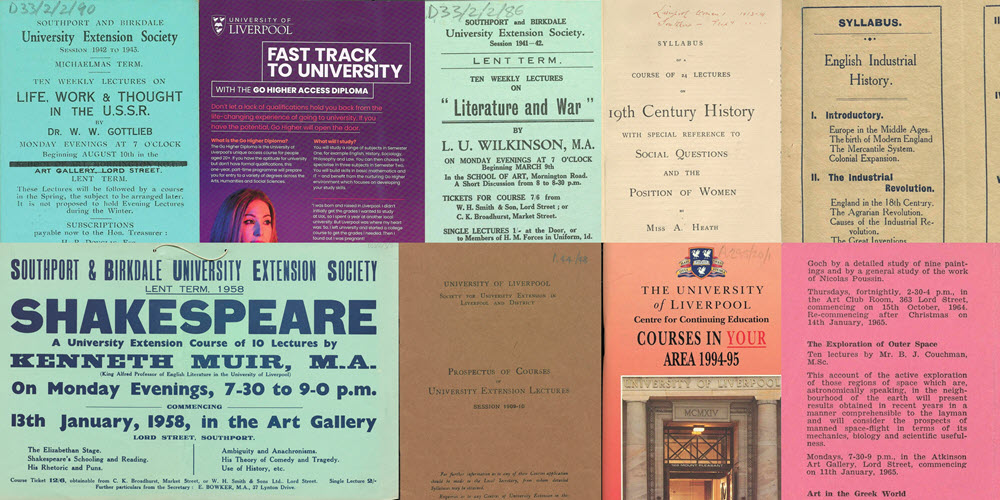
The exhibition marks the 25th anniversary of the University of Liverpool’s pioneering access programme for mature students. It explores not only the story of this transformative course, but also the broader tradition of adult education and civic engagement that has long defined the University’s mission. Tracing a trajectory from the radical energies of the 19th-century Liverpool Royal Institution to contemporary innovations in inclusive pedagogy, the exhibition charts a compelling narrative of education as a tool of empowerment, community, and renewal.
Founded in 1999, Go Higher was designed to meet a specific need: to create an academically rigorous, flexible, and welcoming route into higher education for adults without traditional qualifications. Over the years, it has become a flagship model of widening participation, offering a one-day-a-week course that introduces students to university-level research practices, critical thinking, and seminar-based discussion. Its alumni have gone on to pursue degrees in disciplines as wide-ranging as Law, History, Politics, English, Business, and Popular Music. Some have undertaken postgraduate study, and others now teach on the programme itself. For many, Go Higher has marked not simply a return to education, but the beginning of a new life.
Yet, as the exhibition makes clear, the roots of Go Higher stretch far deeper. In 1817, William Roscoe, one of Liverpool’s leading intellectuals, opened the Liverpool Royal Institution with a powerful declaration: “Education is the proper employment, not only of our early years, but of our whole lives.” That statement encapsulated the civic spirit of learning that would inform the University’s later extension work. From the mid-nineteenth century onwards, the University of Liverpool played a vital role in the University Extension Movement, bringing lectures, tutorial classes, and cultural enrichment to workers’ associations, libraries, schools, and town halls across the North West.
Throughout the twentieth century, this civic mission evolved. During both World Wars, the University maintained its commitment to adult learning, even holding classes for service personnel in bomb shelters. In the interwar and postwar decades, figures like Henry Arderne Ormerod and Thomas Kelly spearheaded efforts to democratise access to higher education. Ormerod’s principle that “there is no bar to the entrance of anyone…provided he shows himself prepared to take advantage of what it can offer” remains foundational to Go Higher’s ethos today. Outreach continued to expand in the 1950s and 60s through regional programmes, residential schools, and the refurbishment of the Royal Institution building as a centre for extra-mural teaching.
The 1970s brought a new wave of radicalism. In 1976, amid community activism in Liverpool’s Vauxhall district, the University partnered with local groups to develop Second Chance to Learn, an intensive, course which required no entry qualifications, aimed at empowering working-class adults. The programme combined academic skills with local history and creative writing, foregrounding lived experience and collective inquiry. Its principles – access, empowerment, flexibility – would later shape the foundations of Go Higher.
The programme’s commitment to social justice has endured. From the early 2000s, it developed targeted pathways in Arts, Humanities, and Social Sciences. It established connections with cultural institutions such as Tate Liverpool and the Landmark Trust, offering students the chance to reflect, write, and study in residencies that dissolved the boundary between learning and lived experience. Trips to the theatre, student-led conferences, and initiatives like Discovering Poetry during the COVID-19 pandemic have helped sustain the community spirit that defines the course.
That spirit has found further expression in the Mature Students’ Breakfast Club, a now-regular event introduced in 2023 to provide a space for conversation, support, and connection. It has also flourished through the continuing work of the University’s Mature Students Society, and this experience will be displayed through the reflective writing of students such as Barbara Milne and Saadat, who speak movingly of the challenges they have overcome and the sense of belonging they have found at the University.
At its heart, Go Higher is both a response to need and a continuation of legacy. It carries forward the energy of pioneering educators like Mary Hickey, who taught working-class women in the early 1900s and whose students campaigned for her own further education. It recalls the commitment of Olaf Stapledon, who supported refugee students such as Wolfgang Brück fleeing Nazi persecution. And it reflects the belief, articulated in countless documents, circulars, and syllabi, that education must reach beyond the academy, into the lives of those who have been excluded from it.
The exhibition, then, is more than a retrospective. It is a testament to the living idea that universities must not simply admit students but actively welcome them: through accessible structures, meaningful relationships, and a recognition of the “super-abilities” adult learners bring with them. As Claire Jones, current Director of Go Higher, reflects, it is “humbling to hear about the obstacles some of these students, especially refugees, have had to overcome.”
The exhibition stands as a celebration of all those who came to education later in life – and a call to continue reimagining what a university can be. Through engagement and innovation, it renews an old promise: that higher education should be open not only to the few, but to all.